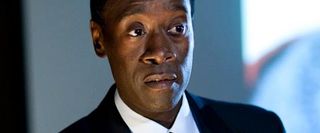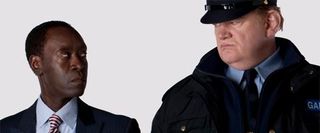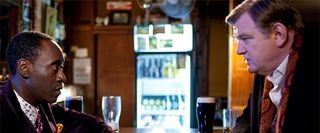Interview: The Guard's Don Cheadle

It’s hard not to appreciate the work of Don Cheadle. An actor with seemingly endless range, he can play everything from a hotel manager in Rwanda to a former porn star who just wants to open a stereo equipment store. The man can do both anything but in The Guard it’s all about exercising your funny bone.
A few weeks back I had the opportunity to take part in a roundtable interview with the Oscar nominated actor, who plays an out-of-his-element FBI agent in the Irish film. Check out the interview below in which Cheadle talks about his time in Ireland, crafting his character’s backstory and what he did, or didn’t, learn about prejudice from making the film.
So Don, how did you come to this project and why did you want to both star and executive produce?
Because I’m a megalomaniac. No, it came the way they usually comes, no often come, through the agency. My agent sent it to me and I read it and loved it, I read the first page to the last page and then back the whole way through. I thought it was really good and had that nice dark Irish humor that just makes me laugh because it’s so not right. I was really invested in seeing it happen. I met with John Michael McDonagh, the writer-director, he told me that Brendan Gleeson was in, he had written it for him, he wanted him to play the guard. I thought, that’s great, I’ve always been a fan of his for a long, long time and wanted to work with him. So it was kind of a no-brainer. I came on as an executive producer to really, in addition to becoming a kind of green light element to getting it to go, to help shepherd it and do what we always have to do with these small projects that don’t have a lot of studio support, which is to roll up your sleeves and start beating the bushes and trying to find money, and do whatever you can. So that was it, to get in the hustle game a little bit.
Have you seen In Bruges?
Yeah.
What did you think?
CINEMABLEND NEWSLETTER
Your Daily Blend of Entertainment News
I loved it, I thought it was great. I had seen Pillow Man on Broadway a couple of years before that, and a couple of Martin’s plays. It’s a similar, it’s that similar bet perspective on life that’s really particularly Irish in that way, from the literature, it’s very poetic in that same way. I just really responded to it, I thought it would be a great film.
Do you remember your first trip to Ireland? What was it like for you?
Yeah, my first trip was to shoot The Guard. It was weird because it was like, I was there, but I was making a movie too, so it was strange.
Did you feel, was it, did everybody come up to you and want your autograph?
Like, touch my hair, go, “Oh, a black person!” No, we just hung out a lot. We’d go to the set, we’d go to the pubs, put back a pint of Guinness, I’d go to a lot of the golf courses there because I wanted to play at a lot of places like the European Club, just really delved into it and had a great driver who had such a thick accent Irish people were like, “What, I don’t know what the hell he’s saying.” No one understood what he was saying. And I golfed with him and John, he was my driver, we just had a great time, went everywhere and just hung out.
Did this driver know who you were?
He knew once they told him who I was.

You said that you’ve wanted to wrok Brendan then when you worked for them, what was it like? Did you have the same style of working?
I didn’t imagine that he was gonna be as big of an asshole as he was. And a prima donna. No, the first day I met him he came out here and he and John and I just read through the script in a room out here, and from the first couple of moments we started laughing and I was looking at him like, “Oh, you’re twisted.” He’s like, “You’re twisted, we’re both there,” and all three of us are like, “Oh we’re all twisted this is gonna be great, it’s gonna be really good. We wanted to push it even further and then we all looked at each other and went, “No, that’s for us, we can’t do that for...we still want people to see this thing.”
Are you the kind of actor that writes yourself a back story so that you can really...
Uh-huh
So what part of your character was already on the page and what part was the back story that you gave me?
Well I thought it was very interesting, the stuff that he put in there that he was from Wisconsin, but that he was a cop in Atlanta, he talks about, “Oh, you caught a serial killer in Tennessee.” I mean so he’s like this transplant from, and this is nothing that John told me, this is just extrapolation that I did from what was there, was that he’s moved to the south, and he’s lived in the south for a while, and then he went to an Ivy League school, so he’s got a real identity, he’s got a lot of questions about who he is, himself, I think, and who he wants to come off as, you know. You name your kids Stokely and Huey, you know what I mean, you’re saying something. You’re starting to say what you want you want to present yourself to the world. Which doesn’t really jive quite with being a guy from Wisconsin who goes to an Ivy League school. So there’s all of this stuff that I just kind of built in which was great for Brendan to be able to poke at, you know. And it’s nothing that I revealed to him, these are secrets you have for yourself. But it went to kind of fleshing him out, creating this character who is kind of conflicted, in my mind, who had a chip on his shoulder.
What do you think this film teaches you about prejudice?
That it’s good. Prejudice is funny [laughs] No, it doesn’t teach me anything about prejudice, I’ve been black in this country my whole life, but I thought it was, the way that it’s dealt with, like, “Oh god, he’s such a racist.” Like, well, it’s not like we walked into a room and he didn’t see us there and us talking this way, and we overheard it. He’s looking at me and saying it to me to get a reaction. Finally in the film, he says the last thing and I go, “Haha.” At first it gets me, and then he’s like, “Oh, you’re just an asshole. You’re just being affluent, let’s talk about the case.” And once they talk about the case, all of that stuff is gone. So I never read it going “oh, this dude is a bigot,” it’s not Archie Bunker, Archie Bunker believes what he’s saying. This character doesn’t believe what he’s saying, he’s saying it to see if he can make you react, and wants you to react. It’s like, “Oh, now I got you. Now I can bat you around.” It’s just that everything is fair game.

I think at the end an active audience will relate to this because there’s a commonality between Compton and Galway and that I feel like there is a gap that got bridged in the movie.
I’ve never been to Compton, but I have been to Galway, so I don’t know if Compton’s like Galway. So I don’t think you can get good things in that, that’s all I’m saying.
But they do come together.
I guess, my character wasn’t from Compton, but maybe they do. I think in that line, you know, when he says that, to me it’s really funny because Wendell Everett doesn’t know anything about Compton, but he does know about Galway. But you’re saying, exactly, when he goes, “It’s like Compton,” he’s going, “Yeah, these people don’t want to talk to me.” That’s what he’s responding to, not some sort of cultural identity to Compton. He doesn’t know shit about Compton.
Bridging to what you were talking about earlier, was the accent ever a problem?
Really it was only my driver, i swear to you. He was the one guy who no one understood, but me. I mean once, you start to hear, with an accent, when you are totally immersed in a place, you adjust, your ear adjust, you’re like, “Oh, that’s what they’re saying.” And pretty soon you just understand it. Their English is better than ours by the time, it’s just with that dialect.
The responses that your character gives in the movie, is it the response that you really wanted that character to have? Was anything modified at all to make it your responses? You were so cool, sometimes being cool is what pisses people off more than if you just go completely...
Ape shit. No, it was the script. Like I said, I read the script, the script was fully there. There was very little, if any improv that’s happening or adlibs. We’re not really adlibbing. The script was complete when I got it. I just thought it was great. You know a little tweak here and there, but nothing where, I didn’t read anything and go, “Oh, he would not react like this. My character would not respond like this.” No, not at all, it was right there. And I loved that he gets him to sort of put himself on front street, like when he says, “So, you grew up in the projects?” He makes my character go, “No, I didn’t grow up in the projects, I went to an Ivy League school, I was a genius, I’m smart, and you’re an asshole.” It’s like, alright, that’s a big reaction. He makes him think he’s got it, he gets his back up. I think that’s what’s fun about that part, he allows him to, he doesn’t allow him to, he gets to wheedle him and you get to see that sort of blustery thing. He has to learn how to go, “I’m not gonna take everything so seriously.” At the end you see what he’s saying, too.

As an actor, this is the first feature film that John Michael McDonagh has directed. Does that worry you, or when you read a script this good, you go, “You know what, I know he’s a good director because he wrote this script.”
Well no. I’ve worked with other first time directors and it’s been a nightmare, you know. Sometimes they can’t, sometimes everything is too precious. They’ve lived and dreamed and read it over, experienced it forever, they know exactly how everything is supposed to go and if it doesn’t jive with the way they see it, they’re like, “No, he’s gotta do it this way.” I’ve been on sets like that where a first time director has strangled all of the life out of a movie because he’s trying to control it, and you can’t. It’s a living thing, it has to breathe. That wasn’t John. I read the script and went, you’ve written a good script, and we met, we had several meetings, and, “Tell me how you want to shoot it,” and “What’s the concept?” “Give me some movies that are kind of what you’re talking about,” “What’s the world that you’re seeing?” “How are we gonna pull this set piece off?” “Thematically, what’s this?” You know, you probe, you hang out, you get a feel for who the person is. “Oh, you’re sick, you’re twisted.” You drink a beer together, “You made that joke, oh okay, you get it,” you know? Then you just have to roll the dice. And they’re rolling the dice too. They’ve created a character that you’re gonna show up and do your thing and I’m sure sometimes they’re sitting on their side of the camera going, “No! You’re ruining my whole thing!” So, it’s, we don’t ever know. And then we do our whole thing and hand it off to an editor. And that person makes the movie or destroys the movie. An editor can take a bad movie and make it great. They can also take a good movie and make it bad. You never know. That’s why I never get, I’m always thankful for the next job because I’m just like, that one will be what it is, I did the best I can, I hope it works out, I’ll see it at the premiere, hopefully it’s not a piece of shit.

Eric Eisenberg is the Assistant Managing Editor at CinemaBlend. After graduating Boston University and earning a bachelor’s degree in journalism, he took a part-time job as a staff writer for CinemaBlend, and after six months was offered the opportunity to move to Los Angeles and take on a newly created West Coast Editor position. Over a decade later, he's continuing to advance his interests and expertise. In addition to conducting filmmaker interviews and contributing to the news and feature content of the site, Eric also oversees the Movie Reviews section, writes the the weekend box office report (published Sundays), and is the site's resident Stephen King expert. He has two King-related columns.
Most Popular




